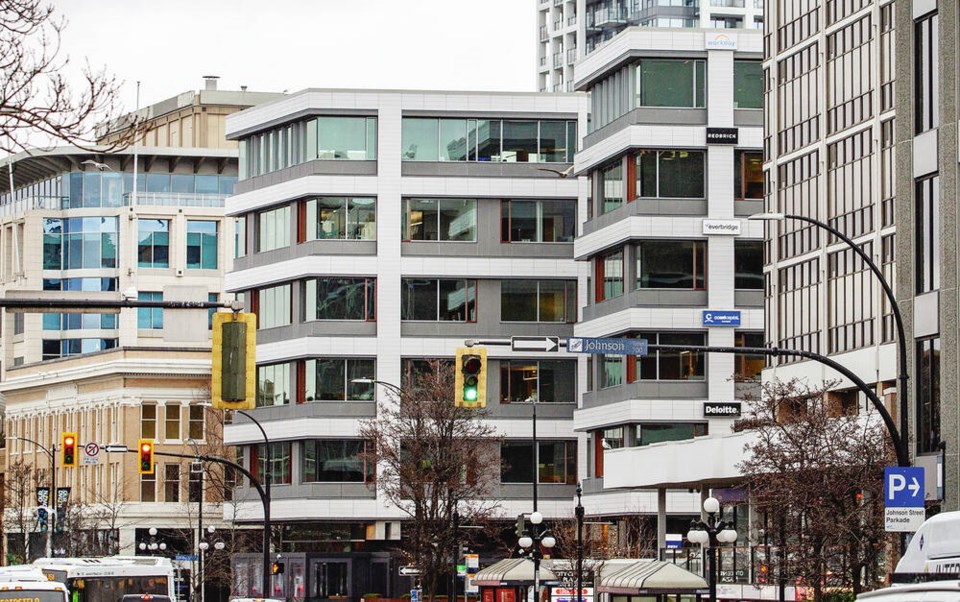Greater Victoria’s office-leasing market will likely be stagnant for the rest of this year, with higher vacancy rates and more subleases as tenants look at downsizing, says a new market outlook.
A major factor is the work-from-home trend, which leaves tenants trying to understand what space they really need, said Ross Marshall, senior vice-president of the investment properties group at CBRE Ltd. in Victoria.
Some have found they have more space than they need and they may look to sub-leasing it.
Landlords are doing their best to work with the tenants they have, Marshall said. “They have to do everything they can to keep existing tenants happy and to try and entice new tenants to come to their buildings.”
When it comes to downtown, some clients don’t want to go there because of social disorder or complaints about parking, he said.
The capital region has 9.37 million square feet of office space, with an overall vacancy rate of 8.7 per cent. Rates vary, but the 2024 forecast for a net asking rent in a class A — top quality — building is about $27.25 per square foot per month, the report said.
Landlords are offering more amenities with more flexibility when negotiating deals, said the report, noting leasing activity has been largely driven by tenants relocating into smaller but higher-quality spaces or subleasing excess space.
As for industrial development, economic instability has led to delays in the pipeline serving that sector, pushing project completion back in the past two quarters, the report said.
Completion of strata-titled industrial projects in the West Shore should help address that shortage, it said.
The new supply is anticipated to inflate the availability rate over the short-term, but that will subside as it meets demand. The sector remains heavily under-supplied outside the West Shore.
Marshall said more warehouses with mezzanine office space or flex office space are coming to the West Shore. The lion’s share of those properties will be light-industrial, commercial-type units as opposed to an office building.
The forecast total of industrial space for 2024 is 9.75 million square feet with a 3.2 per cent availability rate.
As planned industrial projects are completed and that space becomes available, the market is seeing interest from buyers who would have otherwise leased, Marshall said.
Rates for industrial spaces have been climbing year over year for a number of years, he said. “That’s a trend that’s consistent with the rest of the country.”
He does not anticipate rates to decline except for some units that may have been pre-leased.
Some new owners in the West Shore put the units on the market before the sales actually closed, charging about $20 to $23 per square foot. Marshall predicts area rates may be adjusted and will probably stabilize in the high teens or at $20 per square foot.
Asking rates for industrial space will likely stabilize mid-year once tenants move into these strata units and the amount of space on the market stabilizes, the report said.
When it comes to retail-commercial space, some rents can top $40 per square foot depending on the offering, Marshall said.
New retail spaces that have come on the market include Colwood Corners, Royal Bay and nearby Beachlands.
“That area is really under-supplied when it comes to retail and amenities, given the amount of population growth,” as more people are expected, Marshall said.
CBRE has started marketing a new retail centre in Royal Bay and “we’ve had a lot of interest right out of the gate.”
“With the growing population we have, there’s renewed interest and new interest from a number of different national-type tenants that are competing for a lot of these spaces in some of the new grocery-anchored shopping centres,” he said.
Investors, including clients from Europe and Asia, are increasingly interested in purchasing on the west coast of Canada and in Greater Victoria, Marshall said.
CBRE’s national outlook said that real estate investor sentiment is expected to turn positive in anticipation of interest-rate cuts coming this year.
The outlook “forecasts that after declining more than 15 per cent last year versus a year earlier, commercial real estate investment activity will recover in 2024 as credit conditions return to normal and investors get better access to capital.”



